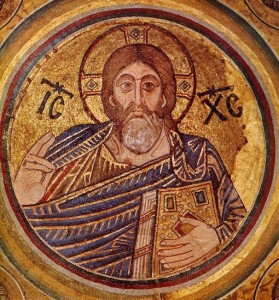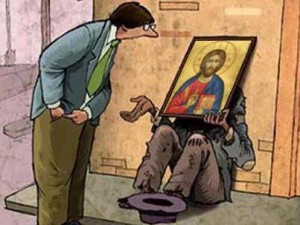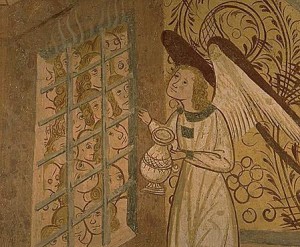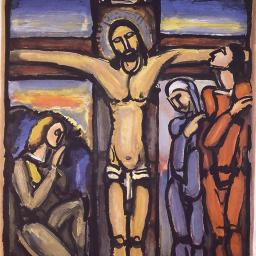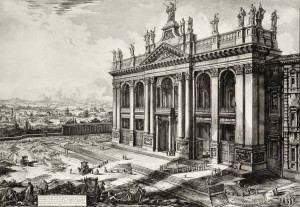 Some may wonder why the Catholic Church honors the dedication of a church in Rome today and not follow the regular course of the liturgical year. The Lateran Basilica is not your ordinary church building. It is the seat of the bishop of Rome’s pastoral authority, it the incarnation of the ministry of St Peter whom the Lord gave the keys to the Kingdom. So, the feast is not merely about a holy temple dedicated to the Lord’s service and our sanctification but also the teaching, sanctify and pastoral authority of the papal office first given to Peter which extends in time until today. It is the place of which each and every Catholic Church and Catholic receives its identity and mission: it is the place when the sacraments and the Good News rings out to the entire world because they are true.
Some may wonder why the Catholic Church honors the dedication of a church in Rome today and not follow the regular course of the liturgical year. The Lateran Basilica is not your ordinary church building. It is the seat of the bishop of Rome’s pastoral authority, it the incarnation of the ministry of St Peter whom the Lord gave the keys to the Kingdom. So, the feast is not merely about a holy temple dedicated to the Lord’s service and our sanctification but also the teaching, sanctify and pastoral authority of the papal office first given to Peter which extends in time until today. It is the place of which each and every Catholic Church and Catholic receives its identity and mission: it is the place when the sacraments and the Good News rings out to the entire world because they are true.
Hence, the Church re-proposes what she professes as the abiding and objective presence of God revealed in history in the new and indestructible Temple, which is the Body of our Lord Jesus Christ, our Savior and the ministry through the ages in the Church.
Saint Augustine teaches:
“What was done here, as these walls were rising, is reproduced when we bring together those who believe in Christ. For, by believing they are hewn out, as it were, from mountains and forests, like stones and timber; but by catechizing, baptism and instruction they are, as it were, shaped, squared and planed by the hands of the workers and artisans. Nevertheless, they do not make a house for the Lord until they are fitted together through love” (Sermon 36.)
This basilica and not Saint Peter’s is properly the Pope’s Church.
The Basilica was dedicated on this date in 324 by Pope Sylvester and holds the title of “The Church of the Most Holy Savior” but also it bears the names of Saints John the Baptist and John the Evangelist.
While not reflecting on the Dedication of the Basilica of Saint John Lateran in Rome Saint Augustine does form a few a ideas to meditate on: “‘Jerusalem that is being built as a city.’ When David was uttering these words, that city had been finished, it was not being built. It is some city he speaks of, therefore, which is now being built, unto which living stones run in faith, of whom Peter says, ‘You also, as living stones, are built up into a spiritual house, that is, the holy temple of God’. What does it mean, you are built up as living stones? You live, if you believe, but if you believe, you are made a temple of God; for the Apostle Paul says, ‘For God’s temple is holy, and you are that temple’.”
But as a little history may be important, Dom Prosper Guéranger offers a perspective on today’s feast:
The residence of the Popes which was named the Lateran Palace was built by Lateranus Palutius, whom Nero put to death to seize his goods. It was given in the year 313 by Constantine the Great to Saint Miltiades, Pope, and was inhabited by his successors until 1308, when they moved to Avignon. The Lateran Basilica built by Constantine near the palace of the same name, is the first Basilica of the West. Twelve councils, four of which were ecumenical, have assembled there, the first in 649, the last in 1512.
If for several centuries the Popes have no longer dwelt in the Palace, the primacy of the Basilica is not thereby altered; it remains the head of all churches. Saint Peter Damian wrote that just as the Saviour is the Head of the elect, the church which bears His name is the head of all the churches. Those of Saints Peter and Paul, to its left and its right, are the two arms by which this sovereign and universal Church embraces the entire earth, saving all who desire salvation, warming them, protecting them in its maternal womb.
The Divine Office narrates the dedication of the Church by the Pope of Peace, Saint Sylvester:
It was the Blessed Pope Sylvester who established the rites observed by the Roman Church for the consecration of churches and altars. From the time of the Apostles there had been certain places dedicated to God, which some called oratories, and others, churches. There, on the first day of the week, the assembly was held, and there the Christian people were accustomed to pray, to hear the Word of God, and to receive the Eucharist. But never had these places been consecrated so solemnly; nor had a fixed altar been placed there which, anointed with sacred chrism, was the symbol of Our Lord Jesus Christ, who for us is altar, victim and Pontiff. But when the Emperor Constantine through the sacrament of Baptism had obtained health of body and salvation of soul, a law was issued by him which for the first time permitted that everywhere in the world Christians might build churches. Not satisfied to establish this edict, the prince wanted to give an example and inaugurate the holy labors. Thus in his own Lateran palace, he dedicated a church to the Saviour, and founded the attached baptistry under the name of Saint John the Baptist, in the place where he himself, baptized by Saint Sylvester, had been cured of leprosy. It is this church which the Pontiff consecrated in the fifth of the ides of November; and we celebrate the commemoration on that day, when for the first time in Rome a church was thus publicly consecrated, and where a painting of the Saviour was visible on the wall before the eyes of the Roman people.
When the Lateran Church was partially ruined by fires, enemy invasions, and earthquakes, it was always rebuilt with great zeal by the Sovereign Pontiffs. In 1726, after one such restoration, Pope Benedict XIII consecrated it anew and assigned the commemoration of that event to the present day. The church was afterwards enlarged and beautified by Popes Pius IX and Leo XIII.
(L’Année liturgique (Mame et Fils: Tours, 1919), The Time after Pentecost, VI, Vol. 15. Translation O.D.M.)

